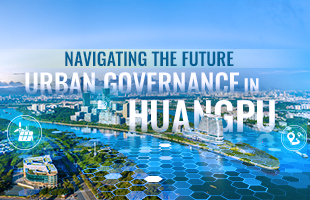Southern Daily: Looking at the new trend of Guangzhou biomedical from a grand event on the island
Updated : 2018-11-16The second year of Guanzhou International Biological Forum
On the 15th, the 2nd Guanzhou International Biological Forum was held in Guangzhou International Biotech Island. Since its inception in 2017, this "Davos Forum" has focused on the development of the global bio-industry and become an annual industry conference and important window for the country and the world in understanding Guangzhou from an industrial perspective.
The theme of this year's forum is “Collaborative Innovation and Development of Life Science in the Guangdong-Hong Kong-Macao Greater Bay Area”. Shi Yigong, Pei Gang and Albert Chan Sun-Chi, three academicians of the Chinese Academy of Sciences, presented wonderful keynote speeches. Six major sub-forums and bio-industry project roadshows for different segments were held concurrently.
The forum produced fruitful results. The National Alliance for Innovative Biomedical Venture Capital Service was announced and the Guangdong-Hong Kong-Macao Greater Bay Area Biomedical Industry Promotion Association (funding) was officially unveiled.
Collaborative innovation in Guangdong-Hong Kong-Macao Greater Bay Area
In the keynote speech, Academician Shi Yigong, a member of the Chinese Academy of Sciences and president of West Lake University, repeatedly emphasized that cutting-edge scientific research and core technology are the real driving force behind economic development. “A first-rate university is needed, with a diverse school-running model, and top-notch talent to support it. In the end, there will be good research institutes, and there will be first-class innovative companies. You can look at the Boston area on the east coast and the West Coast of the United States, two huge engines of innovation in the United States. Their core is the existence of a number of top universities."
As the chief scientist of Guangzhou Pharmaceutical Holdings Limited, Liu Changxiao, an academician of the Chinese Academy of Engineering and honorary president of the Tianjin Institute of Pharmaceutical Research, believes that the planning of the Guangdong-Hong Kong-Macao Greater Bay Area means this is a very good time for a joint venture between state-owned enterprises and private companies to build the Guangzhou biomedical industry. "State-owned enterprises make a great contribution to people's livelihoods, and the potential for civilian-run enterprise development is even greater, because their research and development directions are more flexible."
Albert Chan Sun-Chi, an academician of the Chinese Academy of Sciences and former president of Hong Kong Baptist University, travels frequently between Hong Kong and Guangzhou. In his view, on the 40th anniversary of Chinese economic reform, Guangdong and Hong Kong are at different stages of the market, which stretches from pre-sales to post-sale service, and differ in horizontal development of the service industry. "At the moment we are in the third stage; the future development of Guangdong-Hong Kong-Macao Greater Bay Area is considered to be the best opportunity," said Academician Albert Chan Sun-Chi.
Pei Gang, academician of the Chinese Academy of Sciences and the director of the Guangzhou Regeneration Medicine and Health Guangdong Provincial Laboratory, made three suggestions for the development of the biomedical industry in Guangzhou: first, build a policy highland, making full use of the advantages of the Guangdong-Hong Kong-Macao Greater Bay Area and forming a policy highland in the development of new medicine; second, form a highland of talents. The success of all things depends on talents. It is necessary to attract scholars and enterprises related to biomedicine at home and abroad to contribute to Guangzhou; third, as biomedicine has become an important starting point for innovation and development in Guangzhou we must continue to maintain the continuity of policy and development planning and formulate the next five-year plan for biomedical development as soon as possible.
Pei believes that the development of the biomedical industry requires a complete “ecosystem”, which can be learned from Israel. “In short, Guangzhou has the right conditions and is capable, and I believe it can be done well.”
Two major organizations established to promote industrialization of biomedical achievements
The National Alliance for Innovative Biomedical Venture Capital Service was inaugurated at the opening ceremony. Under the guidance of the National Development and Reform Commission, the alliance will be composed of the SDIC's National Emerging Industry Venture Capital Guidance Fund, the Guangzhou Hi-Tech Industry Development Zone Administration Committee, the venture capital institution, the entrepreneurial service organization, the enterprise, and the research institution, which will seek consensus and cooperation with the government, industry, finance, academia and society, exploring a new model for the development of the venture capital service industry. It will give full play to the agglomeration of venture capital, continuously strengthen cooperation between members in industrial research and judgment, project docking, industry exchange and so on, promote biomedical technology innovation and transformation of scientific and technological achievements, and create a national innovative biomedical professional investment ecosystem.
The establishment of the alliance will encourage the leading venture capital funds and innovative biomedical companies in the biomedical industry to settle in Guangzhou, with priority in Huangpu district and Guangzhou Development Zone. SDIC's National Emerging Industry Venture Capital Guidance Fund will increase investment in Guangzhou's outstanding innovative biomedical companies.
At the meeting, the Guangdong-Hong Kong-Macao Greater Bay Area Biomedical Industry Promotion Association (funding) was officially unveiled. It was initiated by the Guangzhou Regeneration Medicine and Health Guangdong Provincial Laboratory, Zhongshan University and other units, and is composed of economic organizations, research institutes and related units engaged in bio-industry in Guangdong Province, Hong Kong and Macao. An innovative cooperation model combining “political + enterprise + academic + research + clinical + capital” will be adopted to gather industrial and innovative resources of enterprises, research institutes, universities, industry organizations, medical institutions, investment and financing institutions, and other upstream and downstream industries in the bio-industry chain of the Greater Bay Area. It will focus on the major needs of the development of the bio-industry through government support and social operation, and will cooperate with Hong Kong and Macao to build a number of innovative platforms and research bases, promote the effective docking and efficient integration of market resources and the transformation and upgrading of the bio-industry, and create a globally influential biomedical and health industry highland.
"Now, my thoughts have changed and I have figured it out. Some jobs have to be inserted in the end to truly benefit the people." Zhong Nanshan, academician of the Chinese Academy of Engineering and director of the National Clinical Research Center For Respiratory Disease, said that at the Guanzhou Life Science Roundtable held on the 14th. The meaning of “insert a pole into the end” refers to the combination of industry, universities, research, capital and political resources.
Strive for 5 years to build a world-class bomedical health industry
As the epitome of Guangzhou's biomedical industry, Huangpu district and Guangzhou Development Zone continue to increase their industrial ecological advantages, and their industrial development is changing with each passing day. They are struggling to move from “follow-up” to “running along” and “leading”. Under the comprehensive superposition of the Guangdong-Hong Kong-Macao Greater Bay Area, the “Belt and Road” construction, and the Guangzhou-Shenzhen Science and Technology Innovation Corridor, Guangzhou is not only expected to become a leader in the national biomedical industry, but also to increase its “display” on the global biomedical map.
At present, the region has more than 1,000 biomedical enterprises, with a value of more than 70 billion yuan, accounting for 60 percent of the biomedical industry value in Guangzhou and ranking first nationally in that field.
Guangzhou International Biological Island is one of the four strategic development platforms of the Guangzhou Development Zone. It is the main battlefield for the development of biomedical research and development in the whole region, and is committed to building a global biomedical innovation center; its Guangzhou Science City is a high-concentration area for the biomedical industry. The island has gathered more than 430 enterprises in the biomedical field and 12 professional biomedical incubators. More than 70 percent of the scientific and technological innovation resources in the region are gathered here. Sino-Singapore Guangzhou Knowledge City plans to build a biomedical innovation park with global influence, open the GE Industrial Park, add the Guangdong-Hong Kong-Macao Greater Bay Area Vaccine Industry Base led by Academician Zhong Nanshan and the BeiGene Project led by Academician Wang Xiaodong, incorporate the project of InnoCare led by Academician Shi Yigong, and also welcome projects such as GreenLeaf, Akeso Biopharma and Kangrong.
In the future, Huangpu district and the Guangzhou Development Zone will strive to achieve an average annual growth rate of more than 20 percent in the biomedical industry in the region, with an industrial scale exceeding 150 billion yuan. Through five years of hard work they will become a major biomedical health industry center with global influence.
- Investment and Entrepreneurship
- Investment Advantages
- Investment Guide
- Policies
- Key Projects
- Major Industries
- Industrial Parks
- Investment Opportunities
- Technological Innovation
- IPR
- Enterprises
- Talents
All rights reserved. Presented by China Daily
粤ICP备16087157号-1










